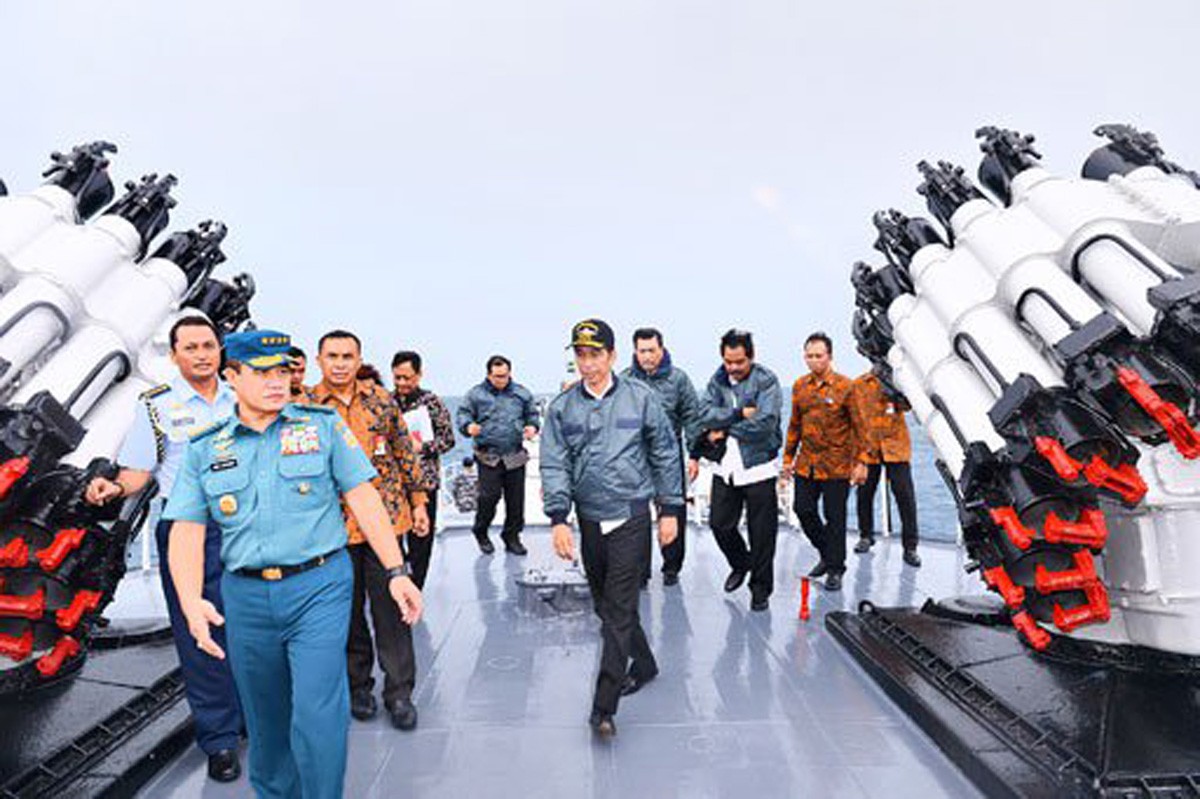Popular Reads
Top Results
Can't find what you're looking for?
View all search resultsPopular Reads
Top Results
Can't find what you're looking for?
View all search resultsA leadership role for RI in the South China Sea
Although formally the government does not consider that it is a disputant, without a settlement Indonesia could easily find itself suffering collateral damage if regional trade implodes.
Change text size
Gift Premium Articles
to Anyone
C
onflict in the South China Sea has a long history. For decades, with varying degrees of intensity, some of the countries bordering the Sea have squabbled over ownership of the small islands and reefs, over control of passage or for the fishery and energy resources.
These disputes have intensified over the past decade and the risks to the region are rising. While the new administration in Manila has made cooperative overtures to the Chinese authorities, the new administration in Washington appears to be threatening a more interventionist approach.
Continued tension, fueled either in the region or from without poses real dangers to all. East Asian economies are highly interdependent and vulnerable to shocks that could come from an interruption to trade.
Real conflict in the South China Sea could wreck havoc across East Asia, especially for China. Although its huge size suggests that it could survive trade interruptions better than its smaller neighbors this misreads the situation.
China has come to rely upon market-based institutions and has progressively opened its border to capital flows: it is increasingly vulnerable to shocks. Conflict in the South China Sea could mean for China what the 1997/1998 Asian financial crisis meant for Southeast Asian nations.
A resolution of the South China Sea disputes is unlikely to come soon or in any simple fashion. What is important is to reduce the tension, to reduce the incidence of violence. This is important to Indonesia.
Although formally the government does not consider that it is a disputant, without a settlement Indonesia could easily find itself suffering collateral damage if regional trade implodes.
How to defuse this situation? One path is to encourage countries to see their cross-Sea neighbors as development partners not just as competitors.
Indonesia has had experience in this through its participation in regional initiatives that work to expand cross-border opportunities for investment and growth.
The Indonesia-Malaysia-Singapore — Growth Triangle (IMSGT) is an example. The IMS-GT has had a considerable impact on the Indonesian islands near Singapore, providing employment to hundreds of thousands of people.
While not perfect, it has encouraged the three countries to see each other as partners not just rivals. The IMS-GT has not eliminated tension between the participating countries. Regional cooperation is not a magic solution for the disputes that governments find themselves in. But this type of initiative can discourage conflict by enhancing the gains from cooperation.
These initiatives give reason and room for government leaders to look past frictions and to search for solutions other than in conflict.
What would a South China Sea regional economic development program look like? From the ongoing efforts, we can distill some lessons learned for a new initiative.
Provide clear and substantial economic benefits by raising the potential for trade and cross-border investment. Indonesia, for instance, can take this opportunity to consider how to encourage Chinese foreign direct investment in the poorer, less developed islands.
While trade promotion and growth enhancement are the highest priority, the goals of the initiative cannot be limited to this. The region faces many challenges that can only really be addressed cooperatively. The fishery resources, for instance, are under tremendous pressure and require cooperative efforts to sustain.
Ensure that the program results in infrastructure investment — infrastructure that improves connectivity.
The lack of infrastructure has stymied growth in many parts of archipelagic Southeast Asia.
Ensure that business investment will flow. The business community must be brought into the planning and execution of any new initiative.
Hold in abeyance territorial claims to the seas and the resources, and jointly harvest, in a sustainable fashion, the resources, utilizing the revenues for common development, especially in coastal areas. The Chinese leader Deng Xiaoping expressed these sentiments more than three decades ago.
Obtain multilateral support for administering the regional project. Impartial technical support is crucial.
Indonesia could take the leadership in such an initiative. The country has considerable experience in regional cooperation efforts; and it has an interest in resolving the South China Sea disputes — there is a real role for Indonesia to play in encouraging a peaceful South China Sea.
---------------
We are looking for information, opinions, and in-depth analysis from experts or scholars in a variety of fields. We choose articles based on facts or opinions about general news, as well as quality analysis and commentary about Indonesia or international events. Send your piece to community@jakpost.com. For more information, click here.









